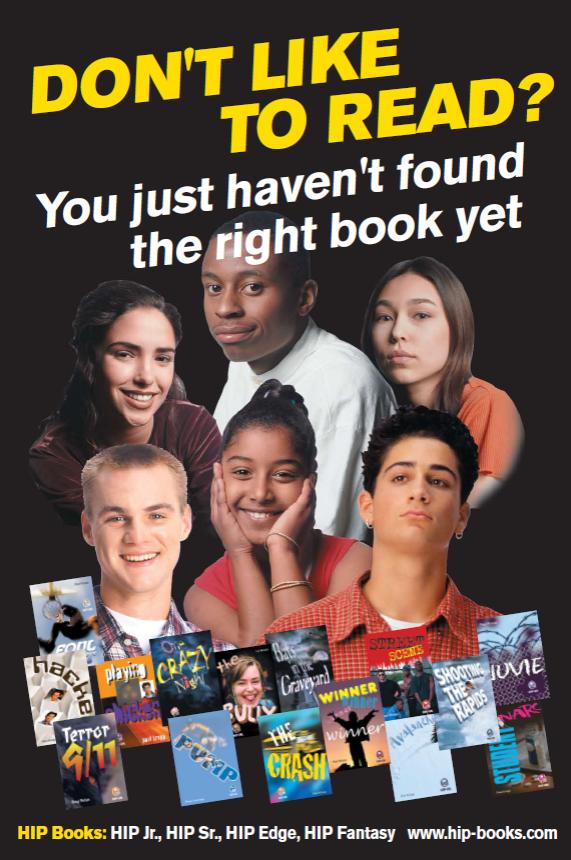
SUPPORTING STRUGGLING READERS
It’s been said that if there’s a kid who doesn’t like to read, it simply means he or she hasn’t found the right book. That may be oversimplifying things just a bit, but there can be something magical about putting just the right book in a student’s hands at just the right moment.
Unfortunately, it’s not always enough. Struggling readers also need explicit comprehension instruction, plenty of opportunities to practise reading and writing, and enriched vocabulary and background knowledge.
Wait a minute, isn’t that what ALL readers need? According to literacy researcher Joseph Torgeson, “The content of effective literacy instruction for students reading below grade is very similar to that recommended for students reading at grade level and above.”
In his book What Really Matters in Response to Intervention (Pearson 2009), Richard Allington states, “Whenever we design an intervention for struggling readers, the single most critical factor that will determine the success of the effort is matching readers with texts they can actually read with a high level of accuracy, fluency and comprehension” (p. 45).
IDEAS FOR INSTRUCTION AND ASSESSMENT
Hooking Struggling Readers with Books they CAN Read and WANT TO Read There is extensive research to support the premise that the best way to become a better reader is to read more. That’s why it’s critical to provide struggling readers with books that are interesting to them, while still at accessible reading levels.
Pinpointing Reading Difficulties: The If/Then Chart Not all reading problems are the same. This chart offers identifies a range of reading difficulties and what teachers can do about them.
10 Things to Look for in Books for Reluctant Readers Every reluctant reader is different. But there are still some common features of books that engage kids who don’t like to read and don’t think they’re good at it.
5 Tips for Teaching Struggling Writers Let’s face it: pretty much all of our struggling readers are also struggling writers. Here are 5 ways to support them.
Books and the “Boy Problem” Boys are significantly more likely to be identified as struggling readers. What are some things we can do to support our boy readers – and benefit our girls as well?
Words that Make you Sound Smart when you Talk About Reading Giving kids opportunities to talk about what they read is one key to helping them become more independent, engaged readers. But too often they don’t know how to talk about texts in a meaningful way. Here is some vocabulary for talking about reading.
10 Things We can Learn from Video Games What is it about video games that makes them so engaging to students, especially boys? And what can they tell us about teaching and learning?
10 Reasons to Use E-Books with Struggling Readers E-books have plenty of potential for hooking our reluctant readers. Here’s why!
7 Tips to Stop the Summer Slide! Studies have shown that the most significant achievement differences among elementary students are due largely to summer reading loss, more than socioeconomic level or other factors. How can we prevent this?
Tackling Tough Texts We can’t control the reading difficulty of text books and other content area reading. Here are some tips for helping students navigate difficult material.
Struggling Readers and the Common Core State Standards With all the hype about complex texts, many educators are missing another key statement of the Standards document: “Teachers who have had success using particular texts that are easier than those required for a given grade band should feel free to continue to use them so long as the general movement during a given school year is toward texts of higher levels of complexity” (CCSS, Appendix A, p.9).
LITERACY ROUTINES
Making the Most of the Independent Reading Program There’s a powerful correlation between how much kids read and how well they read. But how can we make sure that our independent reading programs are doing the job?
Supporting Higher Level Thinking 4 tested routines for promoting deeper thinking.
Readers Theater: The Best Fluency Routine Here is some information from HIP about teaching students to perform readers theater plays, as well as some downloadable scripts.
Literature Circles and Book Clubs: Book discussion groups engage students in reading and talking about their reading. Their key advantage is independence: the students themselves decide what they’re going to read and what they’re going to talk about.
10 prompts for Critical Reading Critical reading goes beyond what the text says to why and how it is said. Here are 10 questions to guide critical thinking.
Think Aloud-Think Along-Think Alone This effective model of instruction applies the Gradual Release of Responsibility.
The Power of Pair-Share The “Think-Pair-Share” model was developed over 30 years ago to help students clarify and articulate their thinking.
Building Reading Stamina Reading full-length fiction requires readers to sustain attention for longer periods of time and hold a number of details in their heads from beginning to end.

